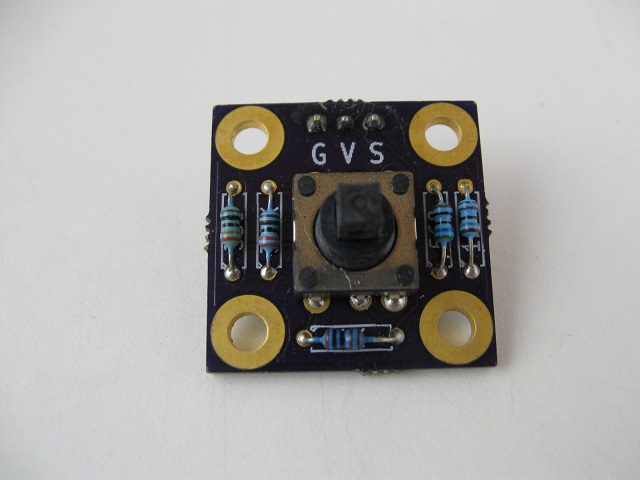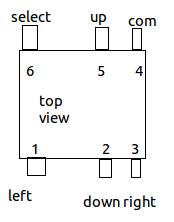Sw5Way
Contents
Five Way Switch
Up, down, left, right and select all in one single button.
As someone who has messed around with buttons for menu navigation including using five separate switches, wires, resisstors, etc, I think that this is a great, little design. It's s a small form factor five way switch. If anything, it's too small.
Thanks to LadyAda/Adafruit for https://www.adafruit.com/products/504 carrying the part. Also http://www.mouser.com/Search/ProductDetail.aspx?R=SKQUCAA010virtualkey68800000virtualkey688-SKQUCA available on Mouser for a few cents less.
This design borrows heavily from the work of others (resistor network into a single analog pin, use of the switch, etc) and adds the innovation of making it all usable in real world applications by providing four solid mounting holes on the corners of the switch make it easy to mount to any panel.
Prototype Received/Built (2012-07-05)
Here's version 1 of the board. Functions great electrically. Works nice on a breadboard although it pivots on the pins into the breadboard when you push on the directional buttons. http://oshpark.com LAEN's service took a while but the boards really look nice and are very solderable - first rate quality at a great price.
Issues with v1 Design - Lessons Learned
The GVS pins are too small to insert a BERGSTIK header. Used the SIP-3 footprint which isn't intended for the larger 0.025" pads. I've made this mistake before. Should have used the PIN_ARRAY library, Built one board with wires soldered into the GVS holes. Built two boards with pins mounted to the surface on the rear side. It's a bit fragile, but it works. Used the R3 footprint in KiCad for the resistors. Didn't realize these holes are spaced too closely together for 1/4W resistors. 1/8W resistors worked really well there and they are lower profile. All of the parts (except the 1.8K are qty 10 or more in the 1K resistor) in the RadioShack 1/8W assortment. Probably SMT resistors would work well here. Silkscreen resistor marked 580 should be 560. The 560 and 1.8K resisors are close to a mounting pad. Silkscreen fir GVS header is on the wrong side of the board. GVS Silkscreeen is too big and not well lined up. A ground plane might be good for noise reduction although I don't think it's really necessary. Noted - anticipated mounting complications. Wasn't able to determine the distance that the the switch is from the shoulder of the switch to the top of the PCB from the spec but I measured 0.15" with my calipers. 4-40 nuts are .09" so a stack of 2 nuts is about 0.18" The switch fits pretty low profile to the card. Washer stackup might work just fine. Description of the Design Purpose is to have a menu navigation control in a small size. This design can operate as a small joystick replacement. Rather than having five separate buttons, this design is all done in one compact part with solid mounting.
SKQU_D_33.GIF
The switch (http://www.mouser.com/Search/ProductDetail.aspx?R=SKQUCAA010virtualkey68800000virtualkey688-SKQUCA Mouser) (http://www.alps.com/products/WebObjects/catalog.woa/E/HTML/Switch/Tact/SKQU/SKQUCAA010.html ALPS, SKQUCAA010) has five positions, left, right, up, down and press in. These are connected to a five resistor network which encodes a unique output voltage for each key press. Common resistor values were chosen to make this an easy to find parts solution.
SKQU_D_31.GIF
SKQU_D_32.GIF
SKQU_C_2.GIF
Output Voltage Values
This is the same resistor network used in the DFRobot (and others) http://www.ebay.com/sch/?_nkw=lcd%20keypad%20shield%20arduino&clk_rvr_id=361983412089 LCD Keypad shield.
Calc Meas total res res to gnd min max cMin cMax Right 0.0 0.0 1800 0 0.3873239437 0 79 up 0.8 0.8 330 2130 330 0.3873239437 1.2268073385 79 251 down 1.7 1.8 580 2710 910 1.2268073385 2.1265453894 251 435 left 2.6 2.7 1000 3710 1910 2.1265453894 3.145121909 435 643 select 3.7 3.8 3300 7010 5210 3.145121909 4.3580599144 643 892 none 5.0 5.0 4.3580599144 5 892 1023
Switch Pinout
Connectors
Single GVS (Ground, Voltage, Signal) style connection. Pin 1 = Ground Pin 2 = Voltage (+5V) Pin 3 = Signal - analog output
Parts List
Ref Des Value Mfg Mfg PN Vendor Vendor PN J1 CONN_3 FCI 68001-203HLF Mouser 649-68001-203HLF R1 3.3K Xicon 271-3.3K-RC Mouser 271-3.3K-RC R2 1K Xicon 271-1K-RC Mouser 271-1K-RC R3 560 Vishay CCF07560RJKE36 Mouser 71-CCF07560RJKE36 R4 330 Vishay CCF07330RJKE36 Mouser 71-CCF07330RJKE36 R5 1.8K Vishay CCF071K80JNE36 Mouser 71-CCF071K80JNE36 SW1 SW5Way ALPS SKQUCAA010 Mouser 688-SKQUCA
Mounting Holes
Four 4-40 mounting holes surround the switch for solid mechanical support of the switch. 5.18 mm - 1.00 mm (panel thickness) Standoff height - using 1/4" tall, 3/16" wide hex standoffs (http://www.digikey.com/scripts/DKSearch/dksus.dll?Detail&itemSeq=116545192&uq=634766755355038882 Keystone, pn 1891).


